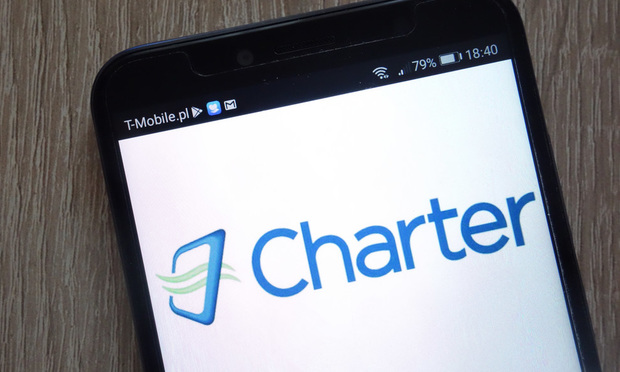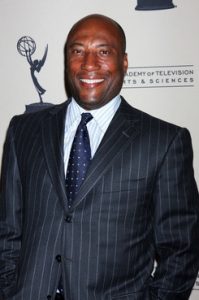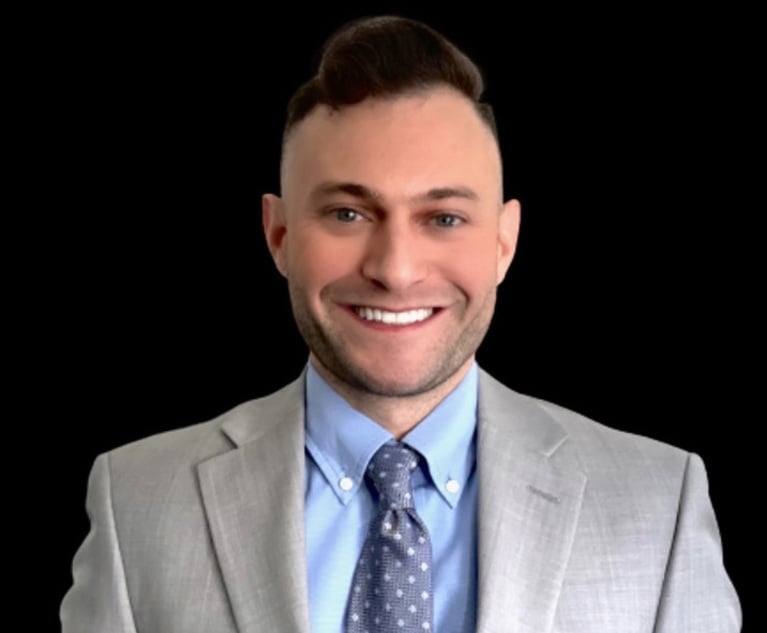Charter Communications Can't Shake Black-Owned Networks' Racial Discrimination Claims
The Ninth Circuit on Monday allowed a group of television networks owned by African-American actor, comedian and entrepreneur Byron Allen to pursue claims that the nation's third-largest cable company did not treat them the same as white-owned media companies.
February 04, 2019 at 04:56 PM
4 minute read
 Aug. 11, 2018: Charter Communications logo displayed on a modern smartphone
Aug. 11, 2018: Charter Communications logo displayed on a modern smartphone
A federal appellate court is allowing a group of African-American-owned television networks to pursue racial discrimination claims against Charter Communications Inc., the nation's third-largest cable provider.
The U.S. Court of Appeals for the Ninth Circuit on Monday upheld a lower court ruling denying Charter's bid to knock out discrimination claims brought by Entertainment Studios, a television and motion picture company owned by African-American comedian, actor and entrepreneur Byron Allen.
Allen claims that executives at Stamford, Connecticut-based Charter treated him and his network differently than white-owned companies, by repeatedly declining to meet with him from 2011 to 2016 about potentially picking up his seven networks as part of cable packages.
Charter's lawyers at Kirkland & Ellis argued on appeal that the trial judge, U.S. District George Wu in Los Angeles, had erred by allowing the suit to move past the motion to dismiss stage. Charter argued that the plaintiffs had failed to plead that racial animus was the “but-for” cause of the company's actions.
But in a 26-page opinion penned by Circuit Judge Milan D. Smith Jr., the Ninth Circuit held that Section 1981 guarantees African-American-owned businesses “the same right” to contract “as is enjoyed by white citizens.”
“If discriminatory intent plays any role in a defendant's decision not to contract with a plaintiff, even if it is merely one factor and not the sole cause of the decision, then that plaintiff has not enjoyed the same right as a white citizen,” Smith wrote. “Even if racial animus was not the but-for cause of a defendant's refusal to contract, a plaintiff can still prevail if she demonstrates that discriminatory intent was a factor in that decision such that she was denied the same right as a white citizen.”
The company had also argued that the First Amendment barred a Section 1981 race discrimination claim based on a cable operator's editorial discretion in programming decisions. But the court further found that Charter's alleged actions weren't protected by the First Amendment.
“Section 1981 prohibits Charter from discriminating against networks on the basis of race,” Smith wrote. “This prohibition has no connection to the viewpoint or content of any channel that Charter chooses or declines to carry.”
 Byron Allen arrives at the ATAS Daytime Emmy Awards Nominees Reception at SLS Hotel at Beverly Hills on June 14, 2012, in Los Angeles.
Byron Allen arrives at the ATAS Daytime Emmy Awards Nominees Reception at SLS Hotel at Beverly Hills on June 14, 2012, in Los Angeles.Plaintiffs, represented on appeal by Dean Erwin Chemerinsky of the University of California, Berkeley School of Law and lawyers at Miller Barondess in Los Angeles, claim that Charter negotiated with other, white-owned networks during the same period that company executives continuously canceled and put off meetings with officials at Entertainment Studios. Charter executives purportedly said they didn't have faith in Entertainment Studios' “tracking model,” even though the company was alleged to have contracted with white-owned networks who used the same model. The company also claimed to have “bandwidth” issues in taking on additional networks although it added white-owned networks in major markets, including RFD-TV, a network focused on rural and Western lifestyles, and the horror channel CHILLER.
Plaintiffs further allege that the Charter executive in charge of programming decisions approached an African-American protest group outside the company's headquarters and told them “to get off of welfare” and accused them of seeking a “handout.” They also claim that Charter's CEO referred to Allen as “boy” when Allen approached him at an industry event and suggested that Allen needed to change his behavior.
Louis “Skip” Miller of Miller Barondess said in an email statement that he and his client were pleased with the decision and looking forward to taking discovery and preparing for trial. “The claim for racial discrimination based on Charter refusing to carry our client's television channels is of national importance,” he said.
Patrick Philbin, a former Kirkland & Ellis partner who has moved to a position in White House counsel office while the case has been pending, argued at the Ninth Circuit for Charter. Kirkland partners Devin Anderson and Jeffrey Powell, who were also on the briefs alongside partners Paul Clement and Mark Holscher, didn't respond to messages seeking comment Monday.
Charter Communications declined to comment.
Read the Opinion:
This content has been archived. It is available through our partners, LexisNexis® and Bloomberg Law.
To view this content, please continue to their sites.
Not a Lexis Subscriber?
Subscribe Now
Not a Bloomberg Law Subscriber?
Subscribe Now
NOT FOR REPRINT
© 2025 ALM Global, LLC, All Rights Reserved. Request academic re-use from www.copyright.com. All other uses, submit a request to [email protected]. For more information visit Asset & Logo Licensing.
You Might Like
View All
'Another Broken Promise': California Tribes Sue Casinos for Allegedly Illegal Profit From Card Games

Just Ahead of Oral Argument, Fubo Settles Antitrust Case with Disney, Fox, Warner Bros.

Lawsuit alleges Fox Sports ex-host harassed hairstylist and offered her $1.5M for sex
3 minute read
'Pull Back the Curtain': Ex-NFL Players Seek Discovery in Lawsuit Over League's Disability Plan
Trending Stories
- 1Legal Tech's Predictions for Legal Ops & In-House in 2025
- 2SDNY US Attorney Damian Williams Lands at Paul Weiss
- 3Litigators of the Week: A Knockout Blow to Latest FCC Net Neutrality Rules After ‘Loper Bright’
- 4Litigator of the Week Runners-Up and Shout-Outs
- 5Norton Rose Sues South Africa Government Over Ethnicity Score System
Who Got The Work
Michael G. Bongiorno, Andrew Scott Dulberg and Elizabeth E. Driscoll from Wilmer Cutler Pickering Hale and Dorr have stepped in to represent Symbotic Inc., an A.I.-enabled technology platform that focuses on increasing supply chain efficiency, and other defendants in a pending shareholder derivative lawsuit. The case, filed Oct. 2 in Massachusetts District Court by the Brown Law Firm on behalf of Stephen Austen, accuses certain officers and directors of misleading investors in regard to Symbotic's potential for margin growth by failing to disclose that the company was not equipped to timely deploy its systems or manage expenses through project delays. The case, assigned to U.S. District Judge Nathaniel M. Gorton, is 1:24-cv-12522, Austen v. Cohen et al.
Who Got The Work
Edmund Polubinski and Marie Killmond of Davis Polk & Wardwell have entered appearances for data platform software development company MongoDB and other defendants in a pending shareholder derivative lawsuit. The action, filed Oct. 7 in New York Southern District Court by the Brown Law Firm, accuses the company's directors and/or officers of falsely expressing confidence in the company’s restructuring of its sales incentive plan and downplaying the severity of decreases in its upfront commitments. The case is 1:24-cv-07594, Roy v. Ittycheria et al.
Who Got The Work
Amy O. Bruchs and Kurt F. Ellison of Michael Best & Friedrich have entered appearances for Epic Systems Corp. in a pending employment discrimination lawsuit. The suit was filed Sept. 7 in Wisconsin Western District Court by Levine Eisberner LLC and Siri & Glimstad on behalf of a project manager who claims that he was wrongfully terminated after applying for a religious exemption to the defendant's COVID-19 vaccine mandate. The case, assigned to U.S. Magistrate Judge Anita Marie Boor, is 3:24-cv-00630, Secker, Nathan v. Epic Systems Corporation.
Who Got The Work
David X. Sullivan, Thomas J. Finn and Gregory A. Hall from McCarter & English have entered appearances for Sunrun Installation Services in a pending civil rights lawsuit. The complaint was filed Sept. 4 in Connecticut District Court by attorney Robert M. Berke on behalf of former employee George Edward Steins, who was arrested and charged with employing an unregistered home improvement salesperson. The complaint alleges that had Sunrun informed the Connecticut Department of Consumer Protection that the plaintiff's employment had ended in 2017 and that he no longer held Sunrun's home improvement contractor license, he would not have been hit with charges, which were dismissed in May 2024. The case, assigned to U.S. District Judge Jeffrey A. Meyer, is 3:24-cv-01423, Steins v. Sunrun, Inc. et al.
Who Got The Work
Greenberg Traurig shareholder Joshua L. Raskin has entered an appearance for boohoo.com UK Ltd. in a pending patent infringement lawsuit. The suit, filed Sept. 3 in Texas Eastern District Court by Rozier Hardt McDonough on behalf of Alto Dynamics, asserts five patents related to an online shopping platform. The case, assigned to U.S. District Judge Rodney Gilstrap, is 2:24-cv-00719, Alto Dynamics, LLC v. boohoo.com UK Limited.
Featured Firms
Law Offices of Gary Martin Hays & Associates, P.C.
(470) 294-1674
Law Offices of Mark E. Salomone
(857) 444-6468
Smith & Hassler
(713) 739-1250






